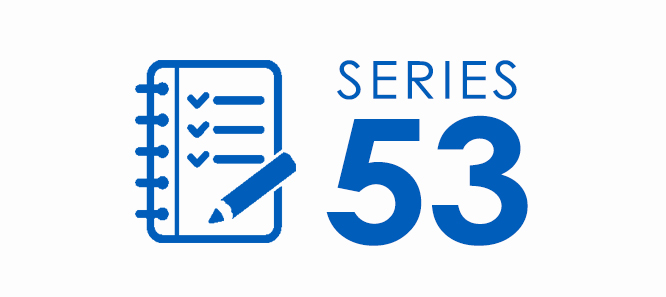The Series 50 Municipal Advisor Representative Exam is recognized as a challenging test by most candidates. This exam is a recent requirement for the municipal advisory profession. Before it was established in 2015, municipal advisory firms and representatives were not subject to registration with the SEC and the MSRB if they were involved in advisory activity only, and not in other types of municipal securities business, like underwriting or trading.
This recent change has subjected many experienced professionals to a securities exam for the first time, and their years of successful experience have been no guarantee of exam success. In fact, practical knowledge can make it even more difficult to prepare for standardized exams like these because of the tendency to channel past experiences and read too much into exam questions.
New entrants to the municipal advisory business face the same challenges as other securities exam candidates when preparing for this test. The body of information that is tested is broad and requires a significant time commitment to master. Finding time to focus, especially while working, is difficult. The confusing language of the municipal industry along with the level of detail makes for a tough test overall.
Series 50 Exam Characteristics
Important Series 50 test facts are summarized in the table below.
| Time Allowed to Complete the Exam | 3 hours |
| Number of Scored Questions | 100 (plus 10 additional unscored questions) |
| Passing Score | 71% (71 questions correct) |
The additional 10 unscored questions will appear randomly throughout your exam, so you need to approach them like any other question even though they don’t count toward your score. These experimental questions are used by exam experts to test their validity and performance before they are added to the MSRB’s question bank.
Content Tested on the Series 50 Exam
Passing this test requires you to clearly understand the day-to-day function of municipal advisors and the boundaries that apply. To be successful, you’ll need to know about pertinent agreements, disclosures, product features, tax law, and municipal industry regulations.
Below is the breakdown of topics and the number of questions that apply.
| Topic | Number of Questions |
| Understanding SEC and MSRB Rules Regarding Municipal Advisors | 12 |
| Understanding Municipal Finance | 35 |
| Performing Issuer’s Credit Analysis and Due Diligence | 12 |
| Structuring, Pricing, and Executing Municipal Debt Products | 31 |
| Understanding Requirements Related to the Issuance of Municipal Debt | 10 |
| Total | 100 |
What Are Series 50 Questions Like?
The Series 50 includes four-option, multiple-choice questions only. Examples of question structure are shown below:
Which two of the following are required when a municipal advisor has fiduciary duty?
- This question style requires selection of two right answers from four choices. While FINRA exams no longer use this type of question, MSRB exams continue to include them.
A feasibility study would include all of the following except:
- “Except” questions are frequently the most confusing and misread questions on standardized tests.
A municipality that issues refunding bonds intends to:
- In this type of question, exam candidates must correctly complete the sentence. This question could also be phrased as a straightforward question:
For what purpose do municipalities issue refunding bonds?
Although the exam is not designed to trick candidates, careful reading is extremely important. Both the question stem and answers are frequently long and wordy. You’ll want to take your time and read every word to avoid costly mistakes.
How Hard Is the Series 50 Exam?
No one says this exam is easy. Questions often seem ambiguous, with more than one possible answer. The process of elimination is valuable, but it’s typically difficult to choose between the last two remaining answers because of the level of detail.
To be well prepared, you need to have precise understanding of these key concepts:
- The disclosures that must be made in documenting relationships between the issuer, advisor, and other municipal professionals
- Conflicts of interest in advisory activities
- The “line” between advisory and underwriting activities
- Different types of refundings and consequences
- Techniques to protect against future interest rate fluctuations
- IRS rebate rules and unique tax consequences that apply to municipal securities
- The roles of various municipal securities professionals in bringing new issues to market and investing proceeds
Best Practices for Passing the Series 50
To pass this exam the first time around, commit to a thorough study process with consistent study habits.
- Start by reading the textbook, with the goal of achieving a high-level, general understanding of the concepts. You should devote 25%-30% of your study time to reading the textbook.
- Watch the online video lectures, taking careful notes. You can download the slides for note-taking when you access the videos. Your notes will become an important study resource, so stop and start the videos as necessary.
- Download and review the Series 50 Supplement for recent updates. This supplement is found in the Training Center at knopman.com along with other study resources.
- Shift your focus to practice questions to improve retention and understanding. Plan on doing a minimum of 800 questions, but start by taking two 20- to 30-question quizzes on each chapter. Then complete four full-length exams (110 questions each) and aim for scores in the mid-70s. Always use unanswered questions and select the testing mode that allows you to view answers as you go. Don’t try to memorize the questions, because you won’t see exact replicas of practice exam questions on your actual exam. The question may feel different, but you’ll know the necessary information to pass.
- Switch to full-length, timed exams (110 questions in 3 hours). These exams can be scored as you go or at the end to replicate actual exam conditions, but remember to review every question you miss. Strive for scores in the high 70s or 80s.
- Take the benchmark exam in the last week or so before you test. It is designed to present a mix of topics similar in proportion to what you’ll see on the actual exam. Your goal on this exam is 75% or above. Be sure you review incorrect questions very carefully.
- Pass your Series 50 Exam! If you’ve followed the plan and achieved the targeted scores, you can approach your exam with confidence.
Knopman Marks looks forward to working with you in your Series 50 study process. We’re here to help every step of the way. Good luck with your prep!




